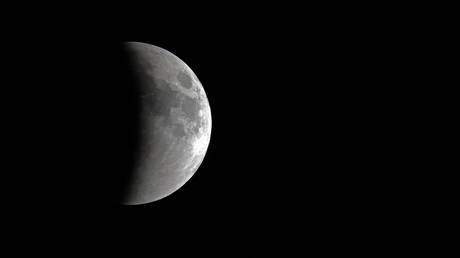ARTICLE AD BOX
The agreement with Beijing is aimed at consolidating Russia’s leading role in space exploration, Moscow has said
President Vladimir Putin has signed a law ratifying an intergovernmental agreement between Russia and China on cooperation in the construction of an International Lunar Research Station (ILRS).
The document, in which the president validates a deal first agreed-on by Moscow and Beijing in 2022, was published Wednesday on Russia’s official legal information portal.
The ratification law last month passed the lower house of the Russian parliament, the State Duma, and last week was approved by the upper house, the Federation Council.
The agreement to cooperate on the Moon station “meets Russia’s interests because it will contribute to strengthening Russia’s strategic partnership with China” and will provide for “the consolidation of Russia’s leading role in the exploration of outer space, including in the exploration and use of the Moon,” an explanatory note to the law reads.
Working jointly with Beijing will also increase the efficiency of the research carried out at the ILRS, and will mitigate the potential technical and financial risks associated with exploration and use of the Moon, as well as facilitating the training of scientists and other personnel for future space projects, it added.
Read more Russian and China step closer to building lunar station
Russian and China step closer to building lunar station
The ILRS is being developed by Russia’s space agency Roscosmos and China’s National Space Administration (CNSA). But, according to Moscow and Beijing, the project, which aims to “promote humanity’s exploration and use of outer space for peaceful purposes,” remains open to all interested countries and international partners. It has already been joined by nine other nations, including South Africa, Egypt and Pakistan.
It’s planned that the space facility will consist of a station on a lunar orbit and a moon base on the surface. It’ll be supported by several smart mobile rovers and a hopping robot, CNSA and Roscosmos said earlier.
According to a roadmap provided by the Russian space agency, the ILRS is expected to become operational by 2035. With the project divided in several stages, Russia and China plan to select a location for the moon base by 2025, with construction efforts to follow between 2026 and 2035.
READ MORE: China reaches dark side of the Moon (VIDEO)
When ready, the station will be studying lunar topography, geology, as well as the internal structure of the moon, while also supporting further space exploration in the future, including manned missions to the Moon.
.png)
 5 months ago
4
5 months ago
4








 English (US)
English (US)